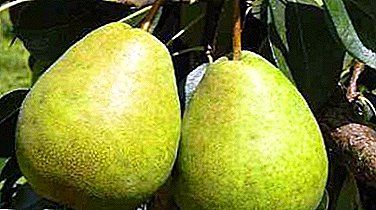
Chinese hibiscus (popularly Chinese rose) is a bright, spectacular plant that at the same time attracts with its unusual beauty and repels negative beliefs. One of the most exciting questions is whether it is possible to keep this plant at home, in an apartment? Let's figure it out together. But apart from the signs, this article will tell you what is the use of the Chinese rose for a person and what is its chemical composition, and whether the flower is poisonous, how it affects the body and how best to place it in an apartment.
Description
Chinese Hibiscus - an evergreen shrub from the Malvaceae family. It reaches a height of 3 m. It has dark green smooth leaves. The homeland of culture is South China and Northern India. The Chinese rose has nothing to do with the pink family. Flowers of bright saturated shades of this plant with a diameter up to 16 cm became the reason of the second "speaking" name.
Chinese hibiscus for some reason is called the flower of death and believe that it can not be grown in the apartment. This is due to the fact that there is a sign in the homeland of the plant: in the period of flowering of hibiscus buds, misfortune, illness or even death comes to the house.
Reference! Folk superstition is based only on the fact that the plant blooms in large single flowers of blood-red awesome color.
Chemical composition
 The composition of the leaves of hibiscus by 70% consist of carbohydrates, 15% - protein, 5% - fats and up to 10% in the total volume of ash, phosphorus and potassium. In the fruits of the plant there is practically no protein, there is a lot of fat and the number of carbohydrates also prevails.
The composition of the leaves of hibiscus by 70% consist of carbohydrates, 15% - protein, 5% - fats and up to 10% in the total volume of ash, phosphorus and potassium. In the fruits of the plant there is practically no protein, there is a lot of fat and the number of carbohydrates also prevails.
Nutritional value of 100 g:
- Squirrels: 0.43
- Fat: 0.65 g
- Carbohydrates: 7.41
- Macronutrients: potassium 9 mg, calcium 1 mg, magnesium 1 mg, phosphorus 3 mg.
- Trace elements: iron 8.64 mg, copper 0.073 mg, zinc 0.12 mg.
Body benefits
The leaves and flowers of hibiscus are most often used as medicines. Seeds are necessary for the preparation of an extract used in cosmetology, pharmaceuticals and phytology. The fruits of hibiscus, being quite high in calories, are rich in vitamins and minerals (phosphorus, iron, thiamine, riboflavin, ascorbic acid, niacin) useful and necessary for the body.
Is it worth growing on the window or not?
Today, the Chinese rose is widely used in gardening. New varieties of this ornamental plant with flowers of different shades and sizes are derived. Hibiscus does not withstand too low and too high temperatures, so in Russia it is ideal as a houseplant. With proper care, the Chinese rose can grow well even on the north windows. The optimal temperature for growing Chinese roses: in the summer - 22 degrees, in the winter - 15 degrees.
How poisonous is the flower?
Not everyone knows that "karkade" or red tea, it is nothing but the brewed petals of a Chinese rose. The plant has a number of healing properties. However, tea from the flowers of the Chinese rose is not recommended for people with high acidity of the stomach, gastritis. It contributes to the development of ulcers.
Important! Expectant mothers should also stop using carcade. Tea increases the tone of the uterus, which can cause premature birth and various complications.
How does hibiscus affect the human body?
Since ancient times, the Chinese rose has been used to treat many diseases and has a positive effect on overall health.
 General strengthening of immunity.
General strengthening of immunity.- The anthelmintic effect and prevention of worms.
- Normalization of blood pressure indicators.
- Antispasmodic action.
- Anti-inflammatory effect.
- Excretion of toxins from the body.
- Hemostatic effect.
- Anticonvulsant and bactericidal action.
- Antioxidant effect.
Plant in the interior: winning design options
From the standpoint of floriculture, growing hibiscus at home is a pleasure.. With proper care, this plant grows into a beautiful tree with amazing flowers. They hold for a short time - about 2 days, but new buds appear quite often.
So that the household can always enjoy a beautiful and healthy plant, you need to pre-select for it a bright and spacious place in the apartment. The best option is on the floor in the corner of the room. Hibiscus will make any room green, it will perfectly fit into any interior and decorate it. Another option is to put the pot on the insulated loggia, creating an imitation of the winter garden.
Why is it sometimes impossible to breed at home?
Hibiscus has several drawbacks. The plant can grow quite impressive for an ordinary apartment - up to 3 meters. Also, the stalk of the Chinese rose is quite expensive compared to other indoor flowers and at the same time is very often exposed to pests.
You can not keep hibiscus at home with allergies or intolerance to the flower. It is also not recommended to put the plant in homes where there are animals or small children. Generally the plant is not poisonous, and the decision about whether to grow it or not, the person himself.
Today, the Chinese rose, despite its beauty, can be found mainly in office and office buildings. I want to believe that the bad reputation of this beautiful plant will fade, and it can be seen in the apartment of every grower.


 General strengthening of immunity.
General strengthening of immunity.









